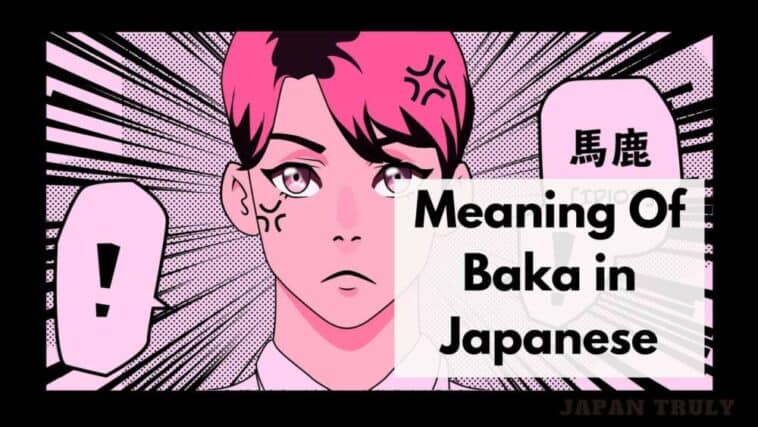Are you wondering what does Baka mean in Japanese? Here’s the breakdown of the Japanese work Baka and its meaning.
“Baka” is a potent word in the Japanese lexicon, often heard in anime and manga. Its meaning extends beyond a mere insult to embody various nuances of foolishness, silliness, and affectionate teasing.
Understanding “baka” offers a glimpse into the complexities of Japanese language and the subtleties of social interaction.
Page Contents
What Does Baka Mean In Japanese?
What Is The Meaning of Baka in English?
Let’s start off with the meaning of Baka to make it easy for our readers. Baka is a Japanese word that can be written in kanji, hiragana, and even katakana letters.

In kanji letters, the word is written as 馬鹿. The first kanji letter (馬) means horse while the second kanji letter (鹿) means deer.
This indicates that both kanji letters speak of animals and the word “Baka” ultimately means is insult or curse word especially to mock someone.
In addition to the original meanings, the word Baka can also have other meanings like an idiot, fool, crazy, retard, etc. However, the kanji letters used to write the word Baka in Japanese are pronounced differently.

For instance, the first kanji letter (馬) which means the horse is pronounced as “Uma” and the second kanji letter (鹿) which means deer is pronounced as “Shika”.This is because kanji letters are ideograms and the meaning of the letters can alter depending on the context it’s used in.
It’s also common for the pronunciation of the kanji letters to alter as well. Since Baka is the common pronunciation of the letters, let’s stick to it and find out about the origin of the word and how it was used during the early days.
The Origin of Baka And How It Was Used
We analyzed the popular meaning of Baka and how the word can be pronounced differently and mean different as well. Let’s take a look at the origin of the word and how it came to be.
It’s reported that the word Baka was initially used in the early 14th century during the Nanboku-cho era in Japan. It’s believed that in 1342 the Ashikaga commander, Toki Yorito used the word “Bakamono” to insult Emperor Kogon.
Another theory states that Baka was originally a Chinese word and it came into practice after a man named Choko introduced a deer to the Qin Dynasty Emperor saying it was a rare horse.
Anyone who disagreed it was a horse was executed hence the people had to admit it was a horse, and thus the word Baka was born.
There’s also another interesting theory that mentions that in Zen Buddhism scriptures, the word Baka was used to refer to a bankrupt or poor family. It isn’t quite certain if the word Baka in Zen scriptures was meant to be an insult toward an impoverished family or if that was the real meaning of the word itself.
We can give countless examples of the origin of Baka but we can’t conclusively rule out the exact date and where Baka was used first. Therefore, let’s pay heed to the present usage and meaning of Baka rather than trying to apply the past meaning of the word to the present.
When And When Not To Use Baka?
Baka is not like any other word that can or should be used on a daily basis. Since the word can be insulting and offensive, there are certain circumstances it can or shouldn’t be used. Therefore let’s take a look at instances when we can use the word, Baka.
You CAN Use Baka When Talking To Friends
Your friends, especially the closest ones can take insults without getting offended. Hence, you can call your friends Baka playfully or you can really mean it to them. Make sure to also be sportive when your friends call you Baka as well because they have the right to insult you back too.
You CAN Use Baka When Talking To Younger Relatives Like Cousins or Siblings
If you have close relatives like cousins or your younger siblings you can call them Baka too. It’s quite normal to call your relatives in nicknames or insults, especially the ones who’re close to you. However, don’t be repetitive or too aggressive with them when calling them Baka.
DON’T Use Baka With Elders
You’re not allowed to use Baka when talking to elders, in fact, it’s considered ill-mannered to use such insulting words in the Japanese culture. The Japanese culture teaches that any elderly person must be treated with the utmost respect, therefore refrain from using Baka or any insulting words with elders.
DON’T Use Baka With Strangers
Don’t ever think of using Baka with a stranger in Japan.He/She may get offended and berate you or report you to the police for harassment. Even if you mean it as a joke, chances are they will probably take it seriously.
DON’T Use Baka At Important Places
Since Baka is an insulting word, it shouldn’t be used at places like schools, hospitals, workplaces, etc. If you were to use it, it’ll only draw bad attention from others and you don’t want to make a bad impression in public places.
Is Baka A Curse Word In Japan?
So far we can be sure about Baka being an insult but is it a curse word in Japanese? This is a matter of dispute and opinions may vary depending on a person.
Saying Baka is a curse word is like saying idiot or fool are curse words in the English language. Certainly, most of us know the types of curse words we have in the English language but none of us do think that words like idiot and fool can be considered curse words.

Of course, those words can be used as insults but stating that fool or idiot are curse words is too extreme. It’s acceptable and permissible to use such words on a day-to-day basis hence they aren’t exactly cursing words.
Similarly, Baka simply means a crazy or foolish person and can be used to refer to someone who’s crazy when considering the meaning.
However, there are exceptions to this. A regularly used word or phrase in one language doesn’t mean it’s not a curse word in another language. Baka could mean fool or idiot in English but it’s one of the popular curse words in Japan that shouldn’t be used frequently.
Although it’s acceptable to use the word among your close friends, you shouldn’t make it a habit to always refer to them as such. In some cases, using the word Baka can be offensive, especially to elders, and strangers.
You can’t also use Baka when referring to someone who’s mentally or physically disabled as well because it’s considered vile and extremely disrespectful behavior towards them.
Therefore, it’s best to refrain from frequently using the word Baka and only to use it on rare occasions.
Interesting Facts About The Japanese Word Baka
There are a lot of interesting facts about Baka that not a lot of people know of. Let’s take a look at them down below.
- Baka is also a popular word in Bengali which means a stupid or foolish person. Goes to show that both Bengali and the Japanese language have the same word with similar meanings.
- Baka is also a common root word in the Japanese language and there are several words starting with the word Baka such as Bakabakashi, Bakamono, Baka-yaro, Baka-yoke, etc. And all these words with Baka as the root word refer to a foolish person or thing.
- The word Baka has multiple meanings like stupid, fool, crazy, obsessed, etc.
- Although Baka means stupid or fool, it has two kanji letters 馬鹿 which means horse and deer.
- The early usage of the word Baka was reported early as the 14th century during the Nanboku-cho period in Japan by the Ashikaga commander. He initially used the word Bakamono to insult Emperor Kogon.
So that’s the end of the blog, hopefully, we solved your dilemma about the actual meaning of Baka and how the word should be used.
What Does Baka Mean In Japanese: FAQs
Do Japanese actually say, Baka?
Baka is a popular curse word or insult in Japan that means ‘a foolish person’ or a stupid person. It’s a word that’s frequently used in anime and manga. The Japanese people say Baka in certain circumstances and they use it on people whom they have a close relationship with. One can call their close friends or relatives Baka. However, it mustn’t be used on elders or strangers.
Is it Ok to say, Baka?
Baka is a Japanese word that means ‘idiot’, ‘fool’, or ‘stupid person. It’s known to be a popular curse word in Japan that’s widely used in anime and manga. Since Baka is considered a curse word in Japan it should only be used for informal occasions and with close friends. However, you shouldn’t use Baka on formal occasions and with elders or senior officials.
Is Baka a swear word?
Baka is a commonly used swear word in Japan which means “stupid” or “fool”. The word can also have several other meanings like “dumbass” or “retard”. Depending on how and to whom the word is used, Baka can either be a swear word or an insult. However, it’s not a good word to be used on elders and those who’re of a higher rank.





